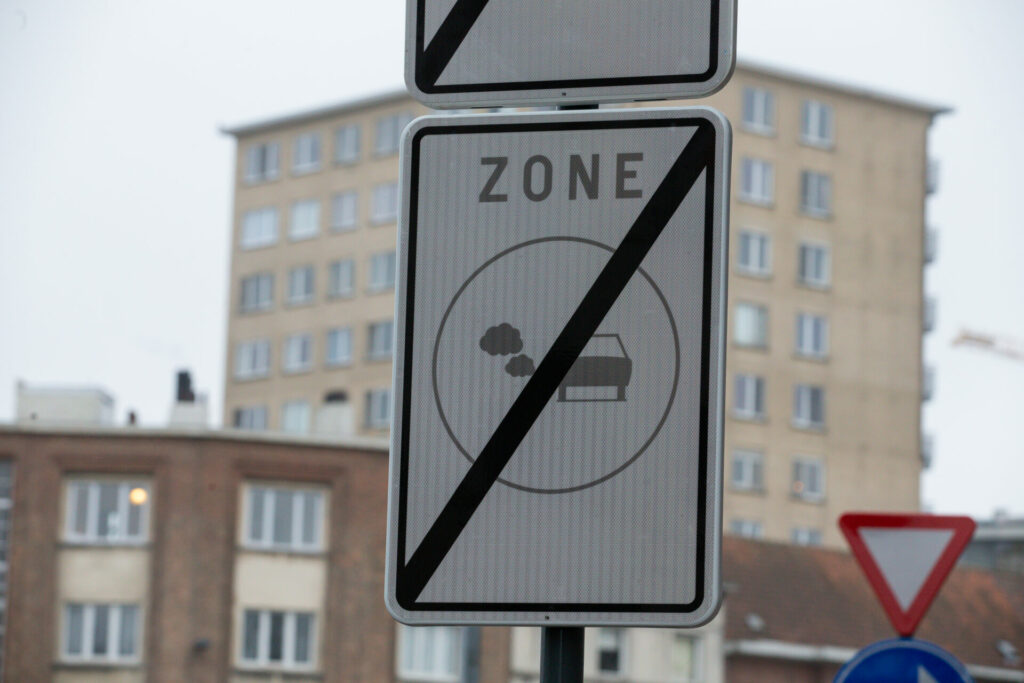Mobility organisation Touring has warned that the further restriction of Brussels' Low Emission Zone (LEZ) planned for 2025 will result in hundreds of thousands of drivers losing the right to drive in the capital region.
Road traffic is one of the biggest contributors to harmful pollution levels in Brussels, with air pollution leading to 7,000 premature deaths a year. Touring therefore introduced LEZs in 2018, which restrict access to the most polluting vehicles across all 19 municipalities, excluding the large Ring Road.
The measure is bearing fruit: the latest results have revealed that, since the LEZs were introduced, the concentrations of several pollutants along the capital's main roads have decreased significantly.
The vehicles included in the LEZ will be further expanded, and the Euro-5 diesels, Euro-2 petrol vehicles and Euro-3 motorcycles will be banned from entering the region from 2025 under the current rules. However, with six months to go before the new restrictions come into force, Touring has called on the next Brussels Government to thoroughly reconsider the plans due to the "potentially disastrous consequences".
Touring warns that the renewal of the car fleet is not progressing at the same pace as the LEZ countdown: some 600,000 passenger cars and 150,000 vans registered in Belgium, including some 33,000 diesel cars in Brussels, risk being banned from 1 January 2025 as they do not meet the required standard.
"The sharp slowdown of the private car market in recent years, the high pressure on families' purchasing power, the high purchase price of electric cars: many families do not have the practical and financial possibility to replace their car with a younger and cleaner one before the end of the year," the organisation said.
'Don't hide behind old decisions'
For these reasons, Flanders and Wallonia have both decided to delay the ban on Euro 5 vehicles with diesel engines in their respective LEZs as it risks excluding too many vehicles.
Touring previously expressed these concerns ahead of the tightening of the rules in Brussels, but argued that the regional Environment Minister Alain Maron (Ecolo) "stuck to the original 2018 timetable, despite major economic changes since then."
"The Minister seems to be ignoring the economic impact of the Covid-19 pandemic, the soaring prices of new and used cars, and the increased pressure on household purchasing power."
Related News
- Study exposes uneven access to green spaces among Brussels schoolchildren
- U-turn on general ban on most polluting vehicles in Wallonia
The organisation recognised that the introduction of the LEZ in Brussels had had positive effects on air quality. However, it stressed that eventually, the "remarkable and rapid positive evolution will continue even with the presence of these vehicles due to the natural replacement of older vehicles, the rise of electric driving, better insulation of buildings and the gradual move away from oil and gas".
"The economic shock that our world has gone through is, according to Touring, more than sufficient reason to at least seriously assess whether the tightening of LEZ restrictions comes at the right time, whether it is feasible and whether it balances the ecological gains on the one hand and the economic costs on the other," the organisation concluded.
The French-speaking socialist party PS already called on the current Regional Government to delay the stricter LEZ earlier this year, also citing high costs for families.

